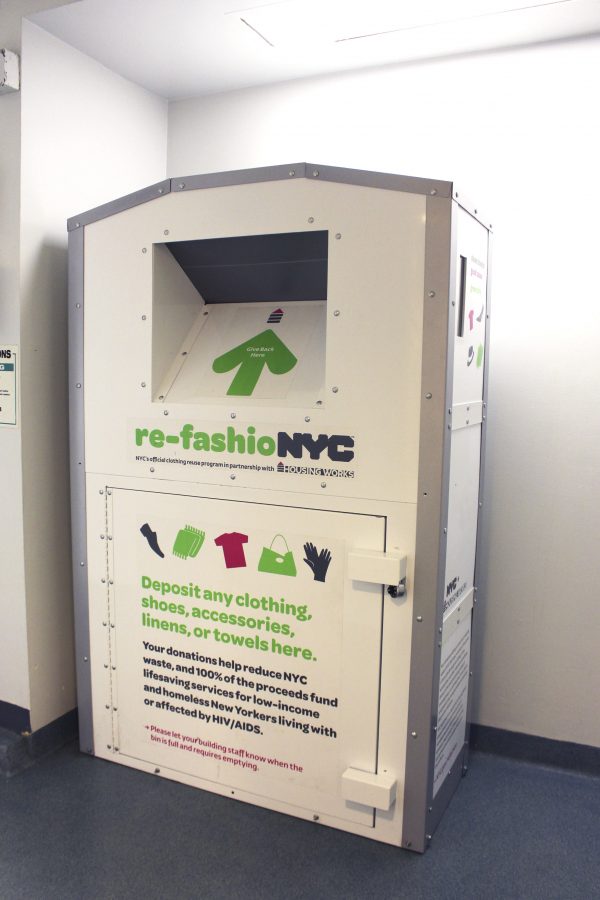NYU Recycles Through re-fashioNYC
Third North’s laundry room holds a re-fashioNYC recycling point — 16 other halls have joined this initiative. The re-fashioNYC program promotes the recycling of clothing, the majority of which is not biodegradable.
April 17, 2017
When recycling comes to mind, many people think of plastic bottles and paper products, but it’s just as important to recycle clothing. Many textiles aren’t biodegradable, so they’ll potentially sit in landfills for centuries. On NYU’s campus, students are encouraged to recycle clothing, rather than trash it.
Re-fashioNYC, a non-profit collaboration between the city of New York and Housing Works, aims to lessen the environmental footprint of textile waste on campus and around New York City.
According to the Housing Works website, NYC residents throw away approximately 200,000 tons of clothing, accessories and linens each year. The re-fashioNYC program offers participating residences, private businesses and offices an alternative bin to place used clothing in, rather than the garbage can. The secure donation bins ensure that any clothing or materials that go into them end up being resold at Housing Works thrift shops or recycled — none of the donations go to a landfill. Plus, the good deed goes even further, as Housing Works donates all of its proceeds to charities working to end homelessness and AIDS.
While NYU has many eco-friendly initiatives, the re-fashioNYC program is a particularly successful one. NYU has been adding more locations each year since the initiative began in 2012 and now 16 residence halls have donation bins. Based on data from the NYU Office of Sustainability, nearly 100,000 pounds of clothing have been donated from the NYU dorms since the university began participating. That hefty sum of textile waste translates to aid for local organizations and the promotion of a clean and green neighborhood.
George Reis, NYU’s manager of grounds and waste management, expressed in an email that the university’s location plays a role in its environmental responsibility. Because of the city’s urban domain, people are confronted with the effects of a lack of recycling every day.
“I would say the density of our urban environment at NYU makes the urgency of recycling even more acute than it would be elsewhere,” Reis said. “The more material we can divert from both our landfills and sidewalk garbage pickup spots, the healthier our environment will be.”
Each residence hall makes a sizable impact on the amount of clothes diverted from becoming litter and garbage. In 2016, Alumni Hall donated 8,190 pounds of clothing and textile products to re-fashioNYC — more than any other dorm that year — according to the NYU Office of Sustainability.
Students like Steinhardt sophomore and Carlyle Court resident Vivian Song value the convenience of the re-fashioNYC bins, which are mostly located in participating residence halls’ laundry facilities.
“The bins are brilliant in the fact that they’re so close and within reach whenever needed,” Song said. “Since everything is in close proximity and being accustomed to convenience in the city, I wouldn’t be able to donate as often nor as much [without the re-fashioNYC program].”
Song also spoke to the pay-it-forward aspect of donating, in terms of eco-friendliness and charitability.
“Donation bins promote a sustainable way of living, which in the long run is beneficial to a society’s standard of living,” Song said. “It can help the environment, and it’s a bonus to declutter
A version of this article appeared in the Monday, April 17 print edition. Email Sophie Shaw at [email protected].


























































































































































